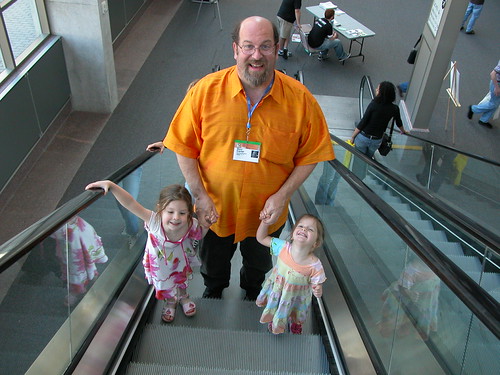
I do not even know where to start with Marc Canter. Honestly he's one of the guys whos been around since the early days of the internet and beyond. Good friend of other great personalities such as Doc Searls, David Weinberger and JD Lasica. I'm excited to announce that our next geekdinner will be with one of the most outspoken and genuine guy in the internet industry today. Marc Canter.
Here's a few snippits from the profile on wikipedia.
Marc Canter is a recognized figure in the sphere of open standards, social networks and blogging, and has been interviewed and quoted on the subject matter in numerous publications. Marc is a frequent speaker and panelist at conferences such as Web 2.0, SuperNova, Gnomedex, AlwaysOn Innovation, SXSW and many others. Marc is also a contributer to many open standards efforts and is champion for end-user controlled digital identities and content – being a co-founder of the Identity Gang
He is the founder and CEO of Broadband Mechanics, a digital lifestyle aggregator  LA) company. Broadband Mechanics builds tools and environments to enable online communities. They target their products at a broad user base with the hope that everyday people can make better use of Internet technologies.
LA) company. Broadband Mechanics builds tools and environments to enable online communities. They target their products at a broad user base with the hope that everyday people can make better use of Internet technologies.
Broadband Mechanics recently released Ourmedia (along with JD Lasica), a community for digital creators to store their work for free. This nonprofit effort provides unlimited storage for grassroots video, audio, music, photos, text and public domain works, and presents a community space to share and discuss personal media.
Broadband Mechanics also recently released StructuredBlogging, a compatability box effort at establishing clear standards for microcontent. This organization has released Perl and Php libraries and plug-ins for WordPress and Moveable Type. StructuredBlogging is a complete superset of microformats.org and has established schemas for events, reviews, lists, media (audio and video), people and group showcases.
You can find his voice on his personal blog
So the details of the event. It will be Monday 1st May downstairs in the Polar Bear's Cellar bar. It will start at 6pm and carry on till late. Yes its a Bank Holiday and I know London's Public Transport isn't the best on Bank Holidays but were starting earlier and bring everything forward so people can get home without too much hassle. The price will be 5 pounds just to cover the range of food as usual. Yes there will be vegatarian food and I have spoke to the polar bear about trying to seperate the food a lot more. I will post a entry on the geekdinner.co.uk website tonight if I can find the login and password. Look out for it on the londongeekdinner Eventful group and the London metro on Upcoming.
Comments [Comments]
Trackbacks [0]





